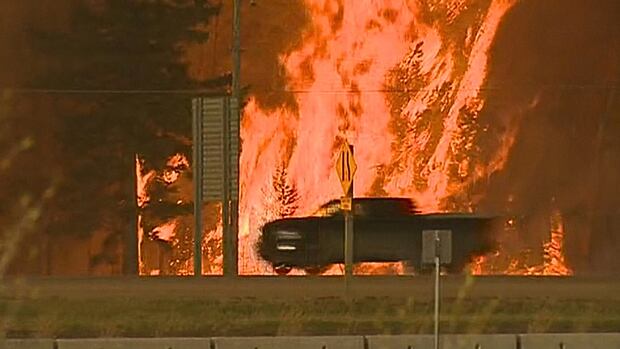Helen Malone-Babineau has escaped not one, but two wildfires in the past eight years. Now, she’s starting over again in Halifax.
“Having experienced Fort McMurray and Yellowknife, both being isolated places with one road out, I said I think I will go somewhere a little bit, you know, with more routes to escape,” she said as she was surrounded by boxes she has yet to unpack.
In the aftermath of the wildfires, she sought therapy. But she said she still feels stressed when she smells smoke or when she reads a post on social media about another wildfire.
Malone-Babineau said she wishes there was more mental health support for evacuees in the medium and long term.
“Somebody that would come out and say: ‘Hey guys, we got this notification about these fires but we want to reassure you’ or explain to you what’s happening and tell you: ‘We’re here if you need to talk.'”
A new study from the Lancet Planetary Journal suggests up to 60 per cent of adults might experience post-traumatic stress disorder up to six months after a wildfire. At least one-quarter might also experience a major depressive or anxiety disorder.

Researchers say the mental health effect of wildfires can linger for years if left untreated. But because mental health impacts are often not as visible as physical health impacts, it can be more difficult to detect and address them.
The authors of the study say something as simple as public health officials checking in on evacuees can make a huge difference. It’s one of the policies being recommended by researchers on how governments can prepare health systems for wildfires.
“What we’ve really recommended is a really broad population level of active soliciting of ‘Hey, how are you doing,’ going to schools, going into workplaces,” said Courtney Howard, an emergency room physician in Yellowknife who is one of the authors of the study.
Other recommendations include making it easier for practitioners to follow evacuees across provincial lines, expanding virtual care, adapting hospital disaster management policies to a changing climate and investing in community programs to help with stressors like insurance claims and housing.
According to the Canadian Interagency Forest Fire Centre (CIFFC), there were 7,131 wildfires that burned across Canada last year. That adds up to 17,203,625 hectares scorched: the highest ever recorded. This year, there have been more than 4,200 fires so far, the CIFFC says. Several communities in British Columbia and Alberta have also been evacuated.
‘I lost everything’
Chris Erickson, who lost his home in West Kelowna to wildfires last year, said taking care of his mental health has been a struggle as he juggles insurance claims, couch surfing and living out of a suitcase.
“To be perfectly honest, in the last year, we haven’t really had time to sit down and really rest with the full impact of what happened,” Erickson said.
“You just kind of get into this go, go, go mode. And in the moments where it’s a little bit quiet, it’s just like: ‘Oh my God, I lost everything.'”

Erickson has made a point of seeking out counselling. He’s also been using crisis lines — a godsend, he said.
Vancouver Island psychologist Claire Sira said when she worked in evacuation centres, she saw patients she knew would need more followup. She said it broke her heart not to be able to offer it.
“The fire might be weeks and months. The recovery is usually years.”
She wants to see government programs that would offer a number of therapy sessions with a psychologist, specifically for evacuees suffering from PTSD, depression and anxiety, who may not be able to pay for the sessions themselves.
“We can be quite effective if we could help them, and so I would very much like there to be longer-term supports to prevent challenges that can have far-reaching ripples.”
New research from The Lancet Planetary Health journal highlights the need for governments to be prepared for the mental health impacts of escaping wildfire.
Dr. Nicholas Mitchell, medical director for mental health at Alberta Health Services, said resources are available for evacuees, online and in person. Sometimes, he said, evacuees just don’t know they’re there.
“The help might be there, but if they don’t know how to access it, they can’t make use of it.”
Mitchell said if evacuees register with the provincial government, public health officials can follow up more easily and offer services.
Howard, the author of the Lancet study, said that communication is also key to how health-care systems adapt to a changing climate — which scientists say can contribute to increasingly intense wildfire seasons.
“We’ve already kind of dropped the ball as adults once, you know, and now we are where we are,” she said.
“If we don’t now accept where we’re at, make investments and make a plan for safety, that’s us dropping the ball again.”
